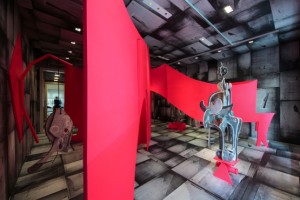
When asked how he felt about his imitators in a 1962 interview, Alexander Calder replied, “They nauseate me.” Aaron Curry’s recent sculptures—which continue to blatantly quote the biomorphic forms pioneered by Calder, Frederick Kiesler and other High Modernists—suggest he wouldn’t mind irking his art-historical predecessors. The show’s tongue-in-cheek centerpiece, Buzz Kill (a hot-red rendition of a Calder-like stabile in aluminum), as well as other sculptures featuring curvy interlocking shapes à la Kiesler and Noguchi, seems eager to take down modernism’s utopian ideals without offering much in their place.
The space-hogging Buzz Kill—along with a grainy black-and-white wallpaper of Minimalist collage patterns that plasters the space, floor and ceiling included—hints at a major statement by aggressively altering the gallery’s townhouse setting. But the work fails to go beyond a kill-the-father treatment of modern art. A recurring image within the wallpaper resembles a straight razor at first glance, and a disembodied cardboard “head” briefly conjures dread, before the limp phallic protrusion it dangles from disperses any serious reaction.
The pieces in the foyer (small paper collages featuring a sci-fi sex-goddess type atop a primitive sculpture, and an alien head affixed to a nude female totem) prime viewers for a transgressive punch that the exhibition fails to deliver. Instead, we get more of the artist’s now-signature wooden sculptures composed of organic, interlocking shapes, including Dezvil, which doesn’t resemble an evil presence so much as a goofy moose with someone clinging to its back. The modernist hope of creating a harmonious society through art may be dead, but stasis and pastiche aren’t suitable replacements.